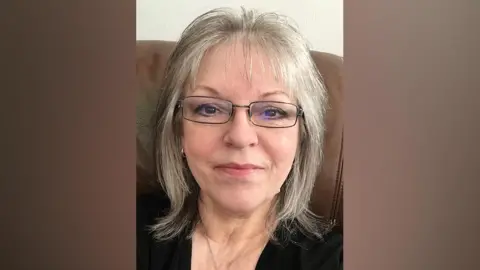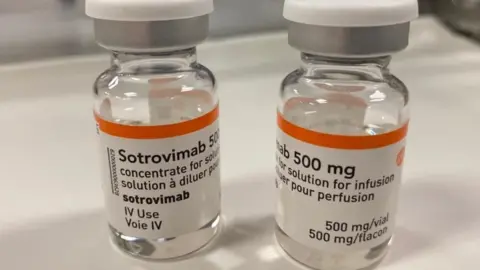Covid-19: Vulnerable people miss out on vital priority tests
 Chris Fraser
Chris FraserSome people in England who are at high risk from Covid say they have been left out of plans to give vulnerable patients quick access to treatments.
Priority test kits were supposed to be sent to people with immune conditions to ensure they could get antiviral drugs within five days of symptoms.
But cancer support groups report they have been flooded with calls from people who have not received them.
Health officials say they have sent out 1.3 million of the priority kits.
Antivirals and monoclonal antibody treatments are a key part of the government's strategy to protect people with immune conditions or with other substantial or significant risk factors as the country ends Covid measures.
Studies suggest that while many people with immune conditions do respond well to the vaccines, a substantial number have a lowered antibody response or no response at all.
Many of them have been living in isolation for nearly two years, and fear that without rapid access to the treatments they will be at greater risk of serious illness or death if they are infected.
Chris Fraser, who lives near Nottingham, said she has chronic lymphocytic leukaemia (CLL) - a cancer which affects the immune system - and has been shielding from the virus since March 2020, but has not received her priority tests and letter of eligibility for antiviral treatment.
She said: "Those of us who haven't received the priority PCR tests are going through absolute hell trying to fight our way through the system to understand what we've got to do now."
When she called the coronavirus 119 helpline as instructed because she had not received her kit by the expected date of 10 January, she was just sent a standard PCR test kit in response.
 GSK/Vir Biotechnology
GSK/Vir BiotechnologyStandard PCR tests can take up to 72 hours to turn around, leaving less time for patients to be given monoclonal antibodies or antiviral drugs in the five-day period during which they are most effective.
Ms Fraser says her GP surgery also told her they had not been informed about the fast-track system for vulnerable patients.
"It's so stressful and causes so much anxiety for people in my situation. We shouldn't have to do this on top of having cancer," she said.
"These treatments will save people's lives. I just am so frustrated, along with so many other people, that this chance has been taken out of our hands."
Leukaemia Care said it had been "inundated" with calls and emails from patients who had not received their eligibility letter and priority test kit.
It said it was concerned about the risks of delays to treatment, adding that many people with leukaemia felt "unsupported, frightened and abandoned".
It called for the NHS to contact patients without the kits, allow them to request one, improve communication with GPs and explore ways for patients to self-refer themselves for treatment if needed.
'Confusion and fear'
Nick York, a patient advocate for Leukaemia Care who also has CLL, said patients are being "sent round in circles", with some reporting making 20 phone calls to try to get priority tests.
He said: "There's a lot of confusion and fear at the moment when we're lifting restrictions and there's a feeling that the most vulnerable have been forgotten.
"There are people who are locking themselves away deeper in isolation in the meantime."
Gemma Peters, chief executive of Blood Cancer UK, said rapid access to Covid treatments for people with blood cancer was "exactly the kind of targeted approach needed to support immunocompromised people when they are still at risk".
She added: "But our support line is hearing from some people with blood cancer who have not been sent PCR tests or have not been able to access the treatments if they have tested positive, and the system seems to be working better in some areas than others.
"It's important that the NHS urgently works out why these problems have happened, so that it is able to make sure everyone who is eligible for the new treatments is able to access them."
As well as some types of cancer, the conditions eligible for priority tests and access to antibody and antiviral treatments include Down's Syndrome, HIV or Aids, severe liver and kidney conditions and some autoimmune conditions.
Other people have said they wrongly received tests when their conditions meant they were not eligible for the treatment.
Jane Lewis, who lives near Aylesbury, Buckinghamshire, said she and her husband, who are both asthmatic, received priority tests at the end of 2021.
When they tested positive in the new year, they were called by a doctor at Stoke Mandeville Hospital who discussed their condition and revealed they did not qualify for the antivirals or antibody treatment. Ms Lewis said she had recently received another replacement priority test.
She said: "It is bonkers the waste of time and money when we are not classed as a priority and frustrating to hear of people not getting the correct access."
The UK Health Security Agency said it was asked to distribute 1.3 million priority tests to immunocompromised patients, based on details provided by NHS England.
A spokesman said: "UKHSA has now fulfilled this request and distributed all PCR test kits requested. We will continue to support this important work by ensuring eligible people receive their PCR test kits as soon as possible, where requested by NHS England."
The agency said some patients may have only recently been diagnosed and there were issues with identifying digital records in other cases.
Kits should be automatically replaced after use, the UKHSA added.
NHS England wrote to trust and Clinical Commissioning Group medical directors on 20 December, telling them that the "modest" number of eligible patients who would not be identified automatically by the national system, such as those who have only recently been diagnosed, should be contacted directly.
The Department for Health and Social Care has been contacted for comment.

- 'I CAN'T REMEMBER THE LAST TIME I DID SOME GOOD': Watch The Responder on BBC iPlayer
- FROM THE STREETS TO THE SCRIPT: How real-life experiences became a thrilling drama

